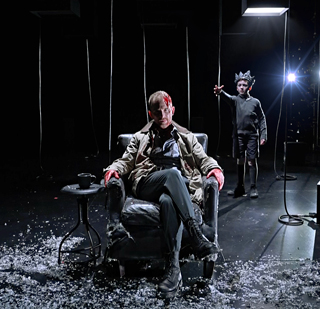
"I am not Prince Hamlet, nor was meant to be [but only] an attendant lord, one that will do to swell a progress," lamented the meek J. Alfred Prufrock, in the poem by T.S. Eliot. How many of us, after all, are destined for glory—or notoriety? That being so, however, why has it taken so long for somebody to interview Banquo?
You heard that right: Banquo of Lochaber, Macbeth's fellow officer in the armies of Scotland and a noble Thane in his own right, but too often dismissed in classroom syllabi as a mere literary device providing a conversational sparring partner for the title character. As an eye-witness to the events that first set Shakespeare's deluded war hero on the road to regicidal crime and civil destruction, though, surely his testimony should be of some value!
Chicago Shakespeare Theatre director Marti Lyons references Eliot's Prufrock in explaining author Tim Crouch's unique entry-point to Banquo's significance. "We all think of ourselves as the protagonists of our own stories, but what changes when we become 'attendant lords' to somebody else's storyline—or little more than tertiary characters on a world stage?"
To be sure, even in the murky afterlife, Banquo remains constant in his loyalty to the comrade with whom his fraternal bond encompasses shared joys and sorrows ("We were friends when my son was born [and] when your child died so young.") The blame for the twisted path leading them to their respective dooms, he insists, lies purely in fickle chance. Apostrophizing his lost friend, he cries, "It could have been me, but it was you" followed by a shrug and a resigned "No hard feelings."
Lyons recalls discovering, during extensive discussions with actor Dan Waller and dramaturgs Gabrielle and Matt Randle-Bent, Banquo's 'complicity' in the chain of events—the suspicions that he doesn't investigate, the warning signs he fails to heed and the probabilities he makes no attempt to stop. His hindsight reckoning over the course of the play, ironically, brings him to compassion for the man he describes as "ambitious, but not evil."
Critics have praised Waller for the intimate intensity he manages to convey, alone, in an empty room furnished only with a blood-spattered armchair. "Dan is a great storyteller," Lyons enthuses, "though we had to re-think the mode of storytelling, since his relationship with the camera is what makes the piece feel theatrical. I wanted our view to remain always connected with the play's emotional logic, while also serving as fixed points to lend a voyeuristic feel to the given circumstances of Banquo's purgatory."
Is the play's goal, then, to have Banquo exonerate Shakespeare's mass murderer? "I don't believe Crouch is asking for us to let Macbeth off the hook altogether" Lyons argues, "but for us not to settle for simple condemnation, either." Instead, she suggests, Banquo entreats us to put ourselves in his place, or Macbeth's, or any of the other players, and to "seriously consider where our choices would take us, if someone offered us the prospect of gaining EVERYTHING"—whatever that word may mean to each of us, individually.
I, Banquo streams at www.chicagoshakes.org through May 16.
Mary Shen Barnidge
Contributing Writer

 Follow Us On Twitter
Follow Us On Twitter